
Taken in Hamburg at Lufthansa Technik. It sort of has that generic “get a job” vibe to it. That’s my balding head chilling on the couch.
I am often asked ’œHow do I get an airline job?’
Luckily, I have some background in this area. I worked as a career counselor at the University of Washington for about five years (go Dawgs), I currently recruit for a $3 billion company in the greater Seattle area, and I have talked to hundreds of airline insiders over the last decade. Through my experiences I have learned a few things (at least I’d like to think so) about getting airline jobs. I also get to see the same mistakes over and over and “omg are you kidding me” over again. I decided to combine my worlds a bit here and give some advice on how to get an airline job (in reality, this advice works for most other jobs as well).
To be clear, these are my personal opinions and thoughts on jobs. Not those of any airline, nor my current or previous employers. These are overarching and for sure will not work for all companies, positions, and people. I like to think I am more right than wrong, but look forward to seeing your ideas and opinions in the comments. I love giving job advice and talking about airlines, so this story could easily go over 10,000 words. Do not worry, I kept it under 2,500 (Editor’s note – it’s 2,566) and I was able to hit all the major pieces.
When looking for a job, always assume that competition will be fierce. Let’s say there are 200 applicants that applied and the hiring manager only wants to phone interview eight. That is not always easy, since there are likely going to be more than eight qualified applicants and 192 people that need to be rejected. This is where small details matter. If a hiring manager has a hard time finding information on your application or you make a few minor errors — you can quickly end up with the 192. Do not be one of them! This is really about quality vs quantity and my advice might be some tough love, but I want you to get that airline job!
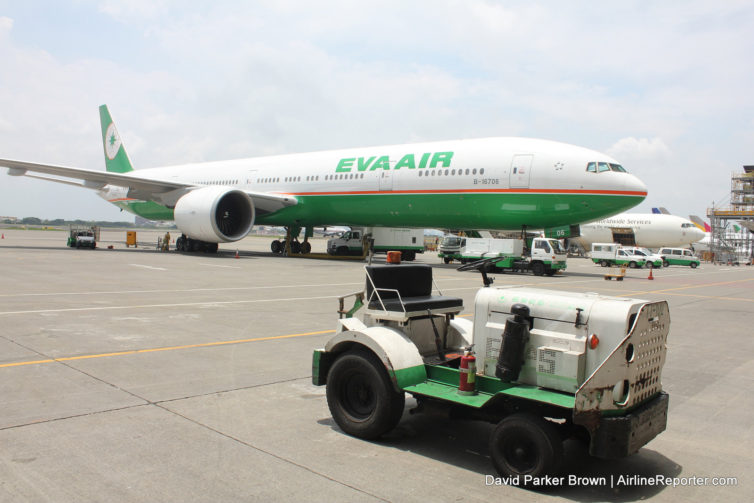
Searching for a job is like searching for a matching tug to your plane (I know, that was lame)
SEARCHING AND APPLYING FOR AN AIRLINE JOB
There is no magical website to find jobs. And the websites you look at will depend on the type of jobs you are searching. You can use your sites like Indeed, LinkedIn, GlassDoor, etc, for some research, but it is best to create a list and keep track of different airlines’ job webpages. Click through them every few days to see if any new jobs have posted. Many jobs pages will have a way to set up alerts, so when new jobs post, you will be notified — use those.
Be prepared to hear from an employer. I cannot tell you how many people do not have their voicemail set up (you get the “this person’s voicemail box has not been set up”) or don’t listen to their voicemails. If there are other viable applicants, companies aren’t going to spend a lot of time getting a hold of you before moving on to the next person. I probably hate voicemail more than most people I am calling, but if you want the job, you need to be prepared to accept a message from an employer.
Print off (or save to PDF) every job description that you apply to. By the time you get invited for an interview, the chances are the job description has been taken down and you likely won’t remember what the job was and that makes the “why would you make a good fit” question hard to answer.
NETWORKING
I am often asked “what’s the best way to improve my chances?” The answer is almost always networking. If you know someone who works at the company (no matter if in a totally different department) reach out to them. See if they know anything about the position, team, or the hiring manager. The hope is they can put in a good word for you. Having a current employee put in a good word is huge for most companies and will increase the chances of getting an interview. If you do not know anyone, then you can use tools, like LinkedIn or Twitter, to find someone. You can even start networking before there is a job for you to apply to; start building that relationship early. The big thing with this is do NOT cross the annoying line. As in pushing too hard, emailing too much. Once you cross that line you go from helping your chances to greatly hurting them.
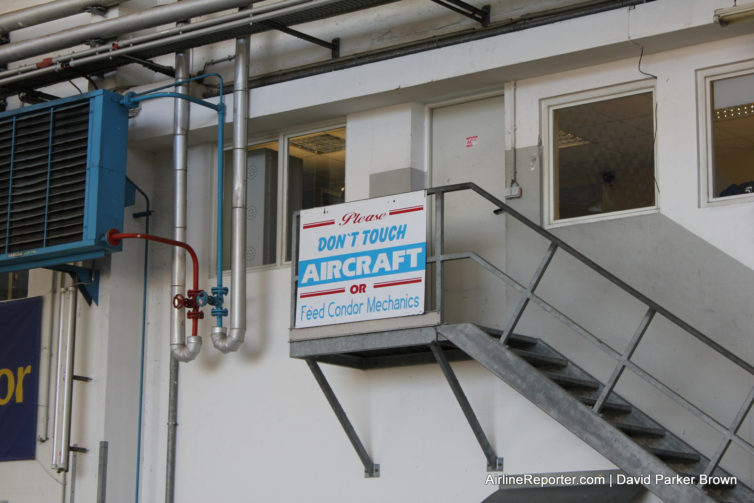
I have always loved this photo and never really been able to use it, so here it is!
ONLINE PRESENCE + SOCIAL MEDIA
If you have not done this yet, Google your name in quotes (“First Name Last Name”). Most employers, at some point, are going to do the same. Look to see how the public can view your social media presence. Some people don’t take chances and lock down all their social media. That can be smart, however, seeing that you love airlines is a good thing. There is a balance.
RESUME
Your resume is the key to your success! So so so so many bad resumes. I get they aren’t the easiest thing to do, but there are many free online resources to help. The biggest piece of advice I can give is work backwards from the job advertisement. The airline is telling you what they want. They will typically have job duties, minimum requirements, and desired requirements. A recruiter is going to spend only a matter of seconds (literally seconds) taking a first look at your details. If they don’t find key words on the top half of the resume — off the “no” pile you might go.
For most jobs, keep it simple. Black and white, bullets, third person, prove to me you can do my job and do it well. Using fancy formats, adding color, doing crazy designs, or trying to go creative can end up annoying the recruiter. You want to avoid annoying the recruiter. Unless you are applying to a marketing position, keep it simple.
COVER LETTER
The resume shows that you have the skillsets to do the job. The cover letter lets you share your passion for wanting to do the job and work for the airline. Make sure it is answering “What are your best skillsets and why do you want to work for my airline and in aviation?” Often times this is your first impression, make it count!
Take the time to make a custom cover letter each time. I know, it is time consuming and annoying (hey, I hate taking my own advice), but recruiters can tell when you are taking the same cover letter, for every job, at different places and just changing the job title and company name. And let me tell you that when you accidentally forget to change the company name, you aren’t starting off on the right foot!
Know your audience. The tone of your cover letter (and really interview, too) should be geared towards the company’s culture. A cover letter to a fun-loving airline like Southwest should be different than one to the more conservative and more luxury-focused Singapore Airlines. I would love to see how swapping those two would work out (don’t try it please).
Spell check! I am shocked’¦ SHOCKED how much bad grammar I see. I am not even talking advanced stuff here. Not capitalizing an ’œi’ or writing to me like you are Snapchatting isn’t going to make you friends. This isn’t just your resumes and cover letters, but emails to the company as well. Have others read your resume and cover letter before you submit them. Not only can they edit the grammar, but maybe they will think of other things you can add.
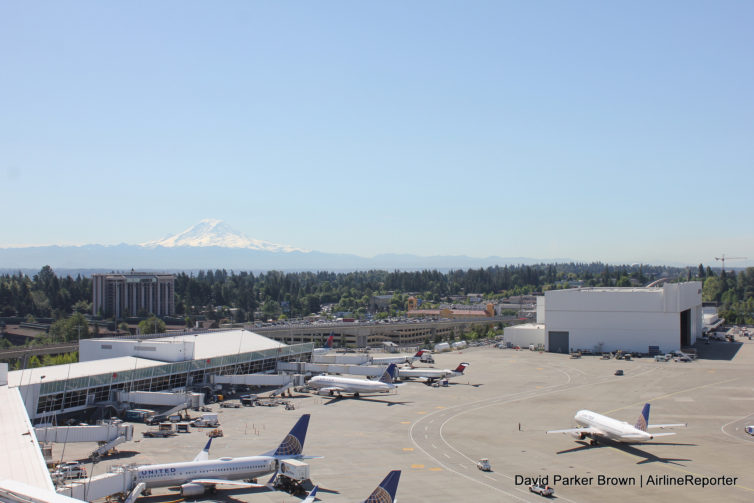
Be mindful that the interview rooms might have a distracting view
THE INTERVIEW
All your hard work paid off and now you have an interview. This is where you really need to start prepping hard. If you have an interview, they are saying they feel you can do this job; now you need to show you are a good fit, and reaffirm your abilities.
You are going to be nervous. If you aren’t nervous, then you are making me nervous. I love job interviews. I enjoy being on the spot, thinking through the answers, reading the room, and trying to make some short-term connections. I know I am not what you would call “normal” (probably why I am a recruiter), but even I am nervous each time I go into one. That is a normal feeling and don’t let it discourage you too much. I have seen too many people sort of give up thinking they were giving poor answers, where in reality they were doing great. And most hiring managers are going to understand you are going to be nervous. One way to help is practice. OMG practice.
I don’t care how prepared you think you are or how well you have done in previous interviews, you need to practice pretty much non-stop until go time. Head to GlassDoor.com and look up the company. There is an interview section that people will share what the interviews look like and the questions you might be asked. Google interview questions — it is likely most of the questions you will be asked are behavioral-based (“tell us a time when…”). You know they are going to ask why you want this job and/or to work for the company. This seems easy, but so many people mess this one up.
Look at the job description (that you hopefully printed and saved) and practice talking about how your skills match what they are looking for. Have family/friends ask you questions and give feedback. Video record and watch yourself (I know, I know, but you want this job right?).
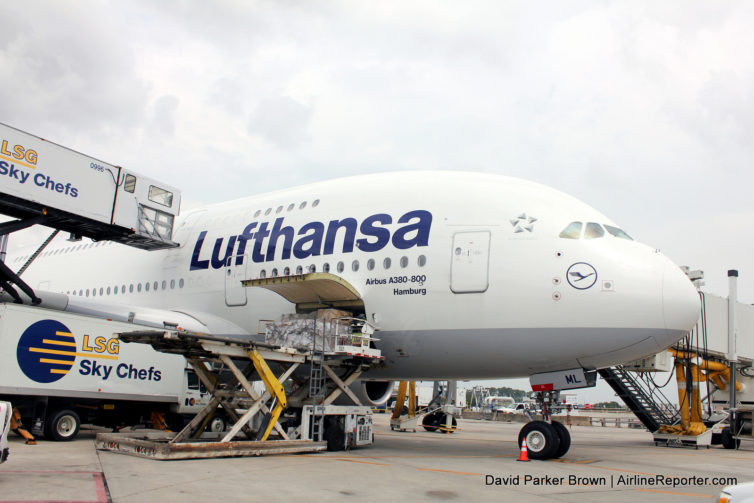
A big plane, carrying big career opportunities
Okay, now that I just worked you all up, take a deep breath and make sure you do not overdo it. I don’t want you sounding like a robot just repeating memorized answers. I like to memorize bullet points of situations that can be used to answer different questions.
Suit it up. I don’t care what the dress code is at the company. Unless they specifically tell you not to wear a suit, wear a suit. (Okay maybe with Southwest you could get away with shorts and a suit top — man I would love to see someone try that). If you do not have a suit, it is well worth the investment. Many stores offer pretty cheap suits, and totally it’s okay heading to the local thrift shop. In the end, if your budget is too tight, then dress as nice as you can, ironing your clothes, and shining those shoes.
The day of your interview, leave early enough that your car can break down, you can catch a cab, and still make it on time. I like to leave so I will be to the parking lot about an hour early. But do not go in to the lobby until you hit 15 min early. It is really hard recovering being late to an interview. Start smiling from the second you leave your house. Someone cuts you off, smile and do nothing. When you arrive, hold open doors and elevators for everyone (hopefully you are doing this anyway). Treat everyone at the company with the respect that they deserve. Anyone could be interviewing you or give feedback.
Leave your phone in the car. Leave your phone in the car. Leave your phone in the car. Oh, did I mention, leave your phone in the car?
At the end, they are likely going to ask if you have any questions. Yes. Always have questions. The best questions are ones that will show you have done your research “With your recent merger with Westcoast Airlines, how is their reservation system going to integrate into yours?” Obviously make it job specific. Also good to ask what their expected timeline is for hiring, make sure to mark that down. Please don’t ask “what is the typical day?” It is asked way too much, there is no typical day, and you should have a pretty good idea, since you applied to the job.
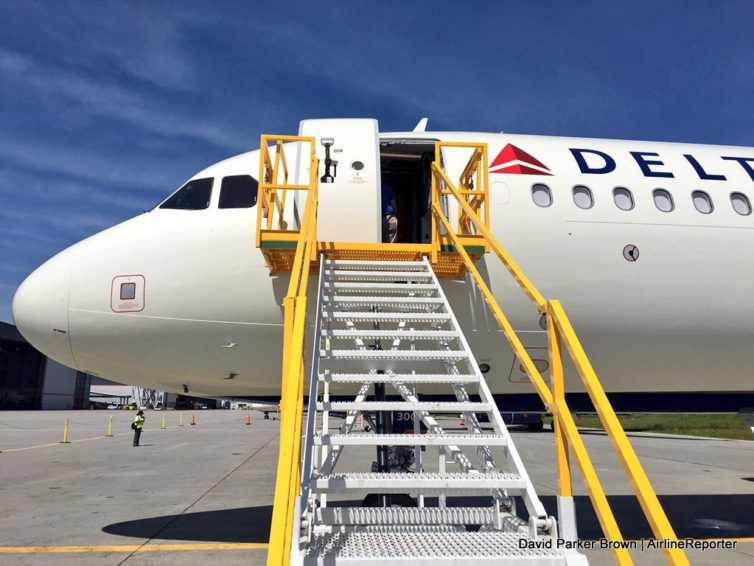
Welcome on board to a new career!
THE AFTERMATH
Sometimes your interview will be with one person, other times a group. If it makes sense, ask for business cards or at least have the contact for the main person. After the interview is over, send a thank you note via email. Totally great if you can work in something from the interview into your note. Now, if you want to go pro, bring a few paper thank you cards with you. Fill them out in the lobby (or away where they can’t see you), then you can give them to the front desk staff. “But David, no one does paper thank you cards anymore.” You are right. So if you do them, you stand out.
Earlier you asked when they hope to make offers. I would suggest if you have not heard anything in a day or two after that date, then do a quick follow up. In the end, if you get rejected, it is okay to ask for feedback. Most companies have policies to give limited (or no) feedback, but you might get a nice nugget of information to use next time.
Now, if you get the job: party time — you have earned it!!!
IN CONCLUSION
Applying over and over and getting rejected over and over sucks. But you have to keep trying to smile and keep going. Often when people get frustrated they go into the numbers game. Which is just applying to as many jobs as they can and hoping for the best. That might work, but you will likely end up with a job you aren’t happy with and even more frustrated than if you still didn’t have a job. Instead, try doubling down on the networking and spending more time on the application.
I worked with a student years ago who came in depressed. She said she applied to almost 200 jobs and had one interview that didn’t go well (I thought she was exaggerating, but turned out it was like 185 jobs). She was using the same cover letter (just updating the company) and resume, not following up, and not networking. After a few weeks of working with her, she was getting multiple interviews and it only took about three months to get a job she was super excited about. I have seen this sort of result happen over and over again for more than a decade. Like most things, the harder you work at it, the better results you will see. Oh yes, there can be lots of luck involved in job hunting (like who your competition might be), but why not increase your odds? In the end, all you need is one interview and one job offer.
I know these are just my ideas and I would love to hear what you think in the comments. What has (or has not) worked for you?
David,
I’d love to get your thoughts on how to ensure interviews aren’t one-sided. I’ve been on plenty now and all too often I spend the vast majority of the time answering THEIR questions. My most recent one we spent 55 minutes on their agenda. The last five minutes were thrown to me for “what questions do you have for us?” I asked one, got a long response then there was a knock at the door with the next candidate.
It goes without saying that in all but a few scenarios, the company and its representatives have the upper hand in the process. These decisions aren’t to be taken lightly, and I appreciate their needs to have their questions answered. However, an interview is not just about the company deciding if the candidate is a good fit, it’s very much about the candidate determining if the company and the team is an appropriate fit as well.
Recently I’ve had a long (and growing) list of questions (not about money) that need answering. It has really caught recruiters off guard when they call to make an offer when I tell them thanks, but before we go further we need to have additional discussion. Perhaps if I was shopping for a paycheck it would be different, but I’m not giving up my rank and tenure at my current company solely for a few extra bucks. To be frank, the whole reason I want to jump ship is to find an org whose mission, values and culture more appropriately align with my own. Work should be meaningful. Maybe this is the millennial in me speaking? I appreciate your thoughts.
You are spot on man! Yes, the company is probably going to ask more of the questions, but this needs to be a two way decision. I am all about being transparent about who we are as a company, including our flaws. I don’t want to talk someone into a job and then have them find out it is not the right fit, and then that team is out of a person again while we try to find a replacement. I will get “I am sorry to be asking so many questions,” but I love it. Means someone cares. And if the company / hiring manager / recruiter won’t make the time or effort to answer those questions for you, that would concern me. In the end, a job interview should be a two way street, making sure it is the right fit for both people.
Any time a hiring manager wants to bring someone in from outside the Seattle area, I triple check that someone has talked to them about the cost of living here. I have lost two new hires who accepted an offer, then started looking at apartments/houses and reality set in. Darn you Seattle!
David
David,
Your advice is spot on and can be applied to just about every profession. I use to recruiter for a large Japanese English conversation school, and I can attest to the fact that recruiters know what they are looking for, and they are looking to spot it quickly. Business speak and trendy verbiage used to always annoy me to no end. Speak truthfully and from the heart with intelligence, and you might land in the follow-up pile, or at least not so quickly in the Reject pile.
Hey Rob,
I was recently just trying to have a laid back convo with a potential new hire the other day. Of course people are nervous and reserve, but I like to think I am pretty good at getting people to relax a bit. But they just keep zinging one liners which sounded like they were reading off business-themed Snapple bottle caps. No thanks. If I am talking to you, I have a pretty good idea you can do the job, I want to know you now! And as a former recruiter, I think you are allowed to misspell things… the candidates need it near-perfect :).
David
You’ll have to reject me since I didn’t spell-check before hitting send! I use to BE A recruiter…But I still can type worth a darn.
Interesting article. But a few things came to mind. First in this day and age why would anyone want to work for an airline. Most of the job don’t pay or benefit well. And the working conditions. I worked for two airlines in my youth and grew up in a airline family. I know some who have the passion will still want these jobs. And so far as advice from recruiters go I can’t really say much. As senior manager with a large technology company I can tell you most within the industry don’t hold recruiters in any genuine esteem.
Hey Brice,
There are many people out there who are pretty darn passionate about working for airlines still. Sure, for some it is just a job and you will find that anywhere, but through my years of writing this blog, I find that aviation is a way of life for many people who work in the industry.
I am very lucky to work for a company that respects the recruitment team. Although, I do not do full cycle and more on the talent management and working hand-in-hand with the hiring managers. Need to be able to work well together in that situation!
David
What great advice for a prospective airline attendent. I’m retired and never was an airline employee of any kind. But, I do have a suggestion for the would-be flight attendant’s answer to the question of “why do you want the job?” If it’s true, tell your interviewer that you’ve flown many times and usually to talk with the flight attendants. You’ve found most like to interact with passengers and they really like their jobs. You relate best to the friendliest flight attendants and feel you are most like them. You relish the challenge of giving assistance to passengers who are sometimes most in need of special help.
Totally agree. I think most people see the flight attendant job more as one of customer service (and surely that is an important part), but also one of safety and security. Being able to understand and talk about passengers with extra needs and how important it is to treat them and their families with respect would probably go a long ways in the interview!
David
Good stuff. Three comments:
A. I’m an editor and I’ll often (not always) toss a pitch if it includes a typo. Perhaps that’s harsh, but it’s a buyer’s market and something like that makes me wonder about other errors that writer might make.
Spell-check is important, but don’t rely on it as your only back-up. If you can’t have someone else read your letter and resume for you, do these two things (do them even if you have a reader). Edit in reverse from bottom to top, and when you think you have the final version, read it out loud.
Be especially aware of auto-correct. It’ll correctly spell a word that you had no intention of using. I once sent an e-mail to someone named Lauralee that turned into “Parolee.” We both had a good laugh, but something like that on a job application will land you among the 192.
B. Back in the days before the Internet, I addressed an application to someone named Laurel as “Ms.” Turned out that it should have been “Mr.” Needless to say, I never heard back (and didn’t even realize that I’d erred until about a year later). In this day and age, doing good research is easy, so there’s no excuse to skimp in that area.
C. After an interview, always send paper thank-you notes. I’m told that that small gesture is ultimately what got me one of my better jobs.
Hey Al, these are all great points as well. Back in the earlier days of LinkedIn, I would use it to help with the Mr. and Ms., but then realized that it is best just to call someone by their full name, since even photos do not always match up to what someone might want to be called :).
David